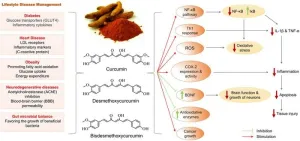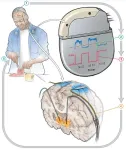(Press-News.org) STARKVILLE, Miss.—With a new understanding of past life on the planet through fossils, a Mississippi State biological sciences faculty member is helping researchers better predict Earth’s future.
In a new paper published in July in the esteemed peer-reviewed journal Proceedings of the National Academy of Sciences, Donald L. Hall Professor of Biology Matthew Brown unearths a specific area of under-studied fossils: microbial eukaryotes—more specifically, testate amoebae from 750 million years ago. His novel research on testates will continue to help researchers understand Earth’s evolution, thereby allowing better predictions of what the planet may look like millions of years from now.
“Using fossils, we can estimate the divergence times and evolutionary paths leading to today’s testate amoebae found across the globe,” Brown said. “Testates are particularly significant for understanding the history of early Earth and the history of life. They represent some of the earliest confirmed heterotrophic eukaryotes.
“From the data we collected, scientists now can examine the evolutionary history of these intriguing amoebae like never before through bioinformatic approaches called molecular clocks,” he continued. “In evolution, genes and the proteins they encode evolve in a somewhat clock-like manner, making evolutionary changes somewhat predictable and model-able.”
Brown and his co-senior author Professor Daniel Lahr at the University of Sao Paulo, Brazil, collaborated with Brazilian paleontologist Luana Morais; Alfredo Porfirio-Sousa, a visiting scholar from the University of Sao Paulo; Alexander Tice, a previous postdoctoral student in Brown’s lab who is a faculty member at Texas Tech University; and Quentin Blandenier, another past postdoctoral student of Brown’s.
Today, Porfirio-Sousa and Blandenier are recognized as testate amoebae experts in the research community.
Brown also credits Nicholas Fry, Tristan Henderson and Felicity Kleitz-Singleton, all Ph.D. students in his lab, with assistance on his project.
Established in 1914, PNAS is one of the world’s most cited and comprehensive multidisciplinary scientific journals, publishing more than 3,500 global research papers annually.
For more details about MSU’s College of Arts and Sciences or the Department of Biological Sciences, visit www.cas.msstate.edu or www.biology.msstate.edu.
Mississippi State University is taking care of what matters. Learn more at www.msstate.edu.
END
Understanding of early life ecosystems highlighted in new publication
2024-08-19
ELSE PRESS RELEASES FROM THIS DATE:
New research finds scalable mindfulness interventions delivered via telehealth improve pain and well-being for veterans with chronic pain
2024-08-19
MINNEAPOLIS/ST. PAUL (08/19/2024) — Mindfulness-based interventions delivered via telehealth in a scalable format can improve pain and overall well-being among veterans with chronic pain, according to new research published today in JAMA Internal Medicine.
In a randomized clinical trial, researchers aimed to test the effectiveness of two eight-week telehealth mindfulness-based interventions (MBIs) designed to be scalable and widely implemented in healthcare systems. MBIs help people pay attention non-judgmentally in the present moment and often involve practices like meditation, breathing exercises or gentle movement.
“Although mindfulness interventions are evidence-based ...
Current HIV prevention medication users often stigmatize other PrEP users as ‘promiscuous’
2024-08-19
Novel findings attend to attitudes of the stigmatized, rather than stigmatizers
Past research identified perception of promiscuity and assumptions that PrEP users are HIV-positive as key drivers of perceived stigma
Perception of stigma is highest among those who believe their sexual behavior puts them at risk for HIV
Knowing others who use PrEP does not influence one’s fear of potential discrimination
CHICAGO --- Public health messaging that drives stigma around Pre-exposure Prophylaxis (PrEP), a medication that can reduce HIV risk by up to 99%, appears to play a role in uptake of the medication. While the potential mismarketing of the drug is well-understood and ...
How "winner and loser effects" impact social rank in animals - and humans
2024-08-19
Research has shown that in many animals, the winners of a fight are more likely to win subsequent contests, while the losers tend to lose their following fights. In experiments where male stickleback fish were randomly introduced to another fish, 65% of the winning fish won the second match, while all losing fish lost the second contest.
Such winner and loser effects can greatly influence individual behavior and fitness. This effect happens in humans as well. In "Winner and Loser Effects and Social Rank in Humans," recently published in The Quarterly Review of Biology, authors Noah M. T. Smith and Reuven ...
Research study examines Alzheimer’s disease drug on tissue samples from people with Down syndrome
2024-08-19
People with Down syndrome are likely to develop Alzheimer’s disease at a young age, with autopsy studies showing that by age 40 years, the brains of individuals with Down syndrome have amyloid plaques. Yet people with Down syndrome have been excluded from or underrepresented in clinical trials of new therapies for treating AD. Lecanemab, which has been shown to target and remove beta-amyloid plaques, has been approved by the U.S. Food and Drug Administration to treat AD early in the disease’s progression. ...
International Society of Biomechanics recommendations for wearables-based motion capture
2024-08-19
Dr. Reed Gurchiek, an Assistant Professor in the Department of Bioengineering, Clemson University, and an Early-stage Investigator, was a co-first author of a recent publication in the Journal of Biomechanics titled “International Society of Biomechanics recommendations on the definition, estimation, and reporting of joint kinematics in human motion analysis applications using wearable inertial measurement technology”. A collaborative effort that incorporated feedback from the biomechanics community has produced recommendations in five categories: sensor characteristics ...
Rutgers researchers discover new way to control the sense of touch
2024-08-19
Rutgers researchers have found a new way to manage the receptors that control the sense of touch, which could lead to treating chronic pain more effectively.
“Identifying a natural molecule that specifically reduces pain sensitivity offers hope for new therapeutic strategies in the management of pain,” said Tibor Rohacs, a professor in the Department of Pharmacology, Physiology and Neuroscience at Rutgers New Jersey Medical School and a member of the Rutgers Brain Health Institute. “Our goal is to translate these findings into effective treatments that improve the quality of life for people suffering from chronic ...
New UH study targets early signs of vision loss in diabetic patients
2024-08-19
A $3.3 million study at the University of Houston College of Optometry will track the health of patients with prediabetes and diabetes to find out who might develop eye problems and be at risk for future vision loss. The study is being led by Wendy Harrison, associate professor, and is underwritten by the National Eye Institute.
Vision loss in type 2 diabetes results from diabetic retinopathy, caused by damage to blood vessels in the retina, the light-sensitive layer of tissue in the back of your eye. The disease can appear without warning.
“The ...
Herbal-based nutraceuticals in management of lifestyle diseases: Experience from Indian population
2024-08-19
Lifestyle diseases, also known as non-communicable diseases (NCDs), have emerged as a major health burden globally, including in India. These diseases, such as obesity, diabetes, hypertension, cardiovascular diseases, and metabolic disorders, are primarily caused by unhealthy lifestyle choices like sedentary behavior, poor dietary habits, and stress. According to the World Health Organization (WHO), NCDs are responsible for 41 million deaths annually, accounting for 74% of all global deaths. Notably, 86% of these premature deaths occur in low- and middle-income countries.
The increasing prevalence of lifestyle diseases ...
Taming Parkinson’s disease with intelligent brain pacemakers
2024-08-19
Media Contact: Robin.Marks@ucsf.edu, (415) 502-6397
Subscribe to UCSF News
Taming Parkinson’s Disease with Intelligent Brain Pacemakers
UCSF studies show personalized, self-adjusting, neuromodulation has the potential to enhance movement and sleep.
Two new studies from UC San Francisco are pointing the way toward round-the-clock personalized care for people with Parkinson’s disease through an implanted device that can treat movement problems during the day and insomnia at night.
The approach, called adaptive deep brain stimulation, or aDBS, uses methods derived from AI to ...
Self-adjusting brain pacemaker may help reduce Parkinson’s disease symptoms
2024-08-19
A small feasibility study funded by the National Institutes of Health (NIH) found that an implanted device regulated by the body’s brain activity could provide continual and improved treatment for the symptoms of Parkinson’s disease (PD) in certain people with the disorder. This type of treatment, called adaptive deep brain stimulation (aDBS), is an improvement on a technique that has been used for PD and other brain disorders for many years. The study found aDBS was markedly more effective at controlling PD symptoms compared to conventional DBS treatments.
“This study marks a big step forward towards ...




